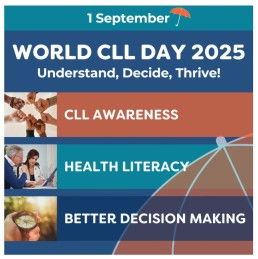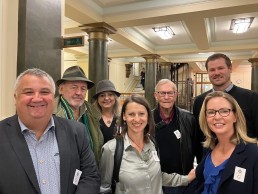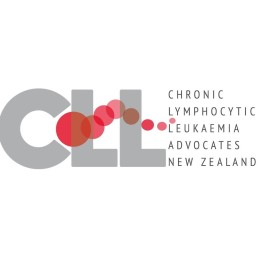CLL Advocates Webinar in Recognition of World CLL Day
CLL Advocates Webinar
Please join us for a Special Webinar in Recognition of World CLL Day
To mark world CLL Day, we invite you to a compelling webinar featuring Dr Graeme Jarvis, Chief Executive of Medicines New Zealand.
Dr Jarvis will share practical insights into effective advocacy - how to move from being unheard to becoming unstoppable.
As Chief Executive of Medicines New Zealand, Dr Jarvis leads the industry association representing research-based biopharmaceutical companies in Aotearoa. The organisation advocates for the benefits of modern medicines as part of a high-quality public health system,
Webinar Details
Date: Monday, 1 September
Time: 6.00pm – 7.00pm NZST
To register: Please email clladvocates@outlook.co.nz to receive the Zoom link.
We look forward to welcoming you online.
CLL Advocates August Newsletter
CLL Advocates August Newsletter
Greetings
Your Trustees have been active since we sent out our last newsletter.
Catherine Isaac, Chair, has resigned and we wish to pay tribute to her:
Thank You, Catherine Isaac
We extend our heartfelt thanks to Catherine Isaac for her dedicated service to CLL Advocates NZ since its inception. Catherine has recently retired from her role as Chair.
Her commitment, insight, and leadership have made a lasting impact on our work and the lives of those affected by CLL. From championing access to life-changing treatments to advocating for systemic change in the Pharmac model, Catherine has been a steadfast advocate and a source of wisdom and encouragement for the team. Catherine’s contributions have left a lasting legacy and we are grateful for the time and energy she has devoted to our cause.
Thank you, Catherine, for everything you’ve done.
Trustees update
Ruth Spearing (CLL Advocates Trustee) has been acting as de facto Chair and keeping us all busy! Ruth has now been elected as Chair.
Rob Crozier made a submission on the Medicines Amendment Bill in May, a copy of which is available on our website: www.clladvocates.nz
Rob was also present at the reading of the budget in Parliament at the invitation of Malcolm Mulholland (Patient Advocate Voice Aotearoa) and managed to make the case about the lack of funding for blood cancer medicines to Radio NZ. The media release has been posted on our website.
Rob has also taken on the role of participating in monthly online meetings of the Pharmac Consumer Advisory Committee which is attended by the Pharmac CEO and senior executives. Pharmac has recently established a Patient Advocacy Network chaired by Malcolm Mulholland with Tim Edmonds, CEO of Leukaemia and Blood Cancer NZ as a member.
The current key concern for us (and for haematologists) is getting Pharmac to approve the use of Venetoclax and Ibrutinib in combination. We are waiting for an update as to where it sits on the priority list. Tim Edmonds raised the need for a Modern Medicines Access Strategy — an idea that we should get behind.
Marc Pearce (Trustee) has taken on responsibility for keeping the clinical trials information on our website and Facebook page accurate and has been researching comparative international data on the proportion of Budget: Health being spent on new medicines.
Lisa Ryan (Trustee) is taking responsibility for our website, alongside Melanie Murray, our valued administrator.
TRUSTEE’S MEETING 6 August
Trustees met in an online meeting and began with a lengthy presentation from Matt Tyson, Janssen, reporting on the stalled approval process for Ibrutinib + Venetoclax for CLL. We had a long discussion about strategy for moving this forward and are now working on implementing that strategy. If you are currently self-funding this treatment or either of the drugs separately we’d like to hear from you.
Trustee vacancy
Trustees decided to defer discussion re adding an additional Trustee to the next meeting — scheduled for 8 September. If you’re reading this and feel you have something to offer watch this space...
Declaration calling for urgent government action
New Zealand’s health system is in real trouble, and a group of passionate health organisations is asking Kiwis to help turn things around.
They’re inviting everyone to sign a Declaration calling for urgent government action, and you can add your name at one of the 16 special events near you on Tuesday, 18 November 2025.
The campaign is backed by Patient Voice Aotearoa, NZNO, RNZCGP, BHAG, Hauora Taiwhenua, and ASMS. Keen to help?
Below is a flyer with information on the Wellington event.
For the other 15 locations, please head to https://www.patientvoice.nz/petition-locations to learn more.
New Zealand’s lack of access to modern medicines
A new poll commissioned by Medicines NZ has ignited political debate over New Zealand’s access to modern medicines, revealing that many citizens feel lives are at risk due to underfunding.
Conducted by Perceptive, the survey of 992 people found that 43% believe the government should fund medicines “much more,” and nearly a third know someone who has paid out-of-pocket for unfunded treatments. Access to medicines is seen as worse than in countries like Australia and the UK, and 36% of respondents said increased funding would influence their vote in the next election.
The findings have prompted finger-pointing among political parties, especially as National previously campaigned on improving access to cancer treatments. Despite a budget boost for Pharmac, New Zealand still lags behind other developed nations, and the issue is expected to be a major election-year flashpoint
Please read the article here: https://www.stuff.co.nz/nz-news/360780977/lives-are-risk-new-poll-thats-sparked-political-debate-and-finger-pointing
Zanubrutinib remains unfunded in New Zealand
Zanubrutinib has been publicly funded and accessible for the treatment Chronic Lymphocytic Leukaemia (CLL) in Australia for more than two years, offering patients a targeted therapy option with proven efficacy and tolerability.
Its availability across the Tasman highlights the growing disparity in access to innovative blood cancer treatments between Australia and New Zealand.
In light of the Government’s failure to deliver on its pre-election commitment to fund blood cancer medicines, this is a clear priority for advocacy ahead of next year’s general election.
Read more here: https://healthtree.org/cll/community/articles/zanubrutinib-leads-in-covalent-btk-inhibitors?
Budget 2025 leaves blood cancer patients behind
Blood cancer patients and advocates are outraged after Budget 2025 failed to allocate new funding for life-saving medicines. Despite last year’s $604M boost for Pharmac, no additional resources have been provided - leaving thousands without access to vital treatments.
Leukaemia & Blood Cancer NZ, the Blood Cancer Alliance, and the Cancer Society warn that the government is simply "re-celebrating" old funding while ignoring a growing backlog of unfunded medicines.
Patients like Rob Crozier, 77, CLL Advocates Trustee, continue to pay thousands for private insurance, while experts call this a "fundamental health policy failure" leading to avoidable deaths.
New Zealand ranks among the worst in the OECD for access to modern medicines. Advocacy groups demand urgent action - blood cancer patients cannot afford another year of waiting. #FundCancerMedicines #Budget2025Fail #NZHealthCrisis
Read more of the article here: https://www.rnz.co.nz/news/national/561987/budget-2025-leaves-blood-cancer-patients-behind
No funding for new blood cancer drugs in the foreseeable future
Rob Crozier, Trustee, sat in on the Budget yesterday in the faint hope that the Government would keep National’s promise to fund new cancer drugs. Rob was invited to join a group convened by Malcolm Mulholland of Patient Voice Aotearoa. We were all bitterly disappointed!
The Budget projects out for 4 years and there is no intention to fund new blood cancer drugs.
Rob spoke to Radio NZ yesterday and posted the following comment on both Stuff and NZ Herald websites:
“There is nothing in this budget for new blood cancer drugs. A promise was made to fund 13 new cancer drugs during the 2023 election campaign. In 2024, 13 of these drugs were funded - however they were all for solid tumours. Shane Reti, then Minister of Health, said that decisions on blood cancer would be delayed until the Cancer Control Agency had reported. They did so in October 2024. There are 24 blood cancer drugs funded in Australia that are not funded here. The absence of any increase for blood cancer drugs simply extends the broken promise made soon after the election”.
CLL Advocates Submission to the Health Select Committee on the Medicines Amendment Bill
Introduction
This submission is made by CLL Advocates NZ, an organisation representing the interests of Chronic Lymphocytic Leukaemia (CLL) patients and their families.
In New Zealand, approximately 2,800 people are diagnosed with blood cancer each year. This number encompasses leukaemia, lymphoma and myeloma. Leukaemia accounts for around 700 cases annually — the majority of these being CLL.
Part 1. Consent to distribute medicines by verification
We welcome this Bill and believe its introduction to be long overdue.
Implementing the proposed changes will speed up the verification pathway for medicines to be approved by Medsafe for use in New Zealand — reducing the time frame from as long as 2 years to 30 days where a particular medicine has already been approved by 2 recognised jurisdictions.
This will be of immense benefit to blood cancer patients who may be able to access medicines recommended by their haematologist, but which have not yet been funded by Pharmac. Regrettably, though, this access will only come about through self-funding, Give-a-Little pages, or health insurance where applicable.
There are many new drugs under development as CLL is the most common blood cancer world-wide and we therefore hope that this proposal might lead to a speedier process for such drugs to be funded by Pharmac. This will, of course, require political will along with appropriate funding for Pharmac.
As an aside, we urge the Government to give greater recognition to the fact that most of the new blood cancer drugs are self-administered at home leading to offsetting savings in the hospital system as fewer people need to be accommodated in Medical Day Wards occupying chairs and nurses’ time.
Part 2. Other amendments
Here we focus only on aspects of the Bill which directly impact blood cancer patients.
Nurse Practitioners: We welcome the proposed change whereby other medical professionals such as nurse practitioners will be able to prescribe approved medicines. We consider this to be of potential benefit to people living in rural areas but would caution that such approvals should only be made in consultation with a suitably trained medical specialist.
Funded Alternative Medicines: We welcome the proposal to allow the prescribing of alternative drugs listed on Pharmac’s pharmaceutical schedule when other funded drugs are in short supply.
Section 29: Again, we welcome the overall thrust of what is being proposed here. It is sometimes necessary to prescribe unregistered medicines for compassionate or other reasons and these amendments seem to facilitate that.
The proposed requirement for the importer or manufacturer to carry more of the burden of reporting on the prescription of unregistered drugs will also lighten the bureaucratic workload of our hospital specialists.
We are pleased that the proposed amendments do not appear to add impediments or burdensome reporting requirements to the prescription of off-label drugs. Off-label prescription is becoming increasingly important as the new generation drugs are able to target subgroup malignancies.
Here is the link to the Medicines Amendments bill: Medicines Amendment Bill
May 16 2025
‘New Zealanders are dying’: Specialist’s plea for blood cancer drug funding
Pharmac on Thursday opened consultation on allowing asthma patients easier access to inhalers - which if approved would exhaust the record $600 million cancer drug investment announced last year.
But there are already calls for the Government to stump up more.
Blood cancer patients weren’t covered by the promise and 59 haematologists - almost all the blood cancer specialists in the country - have signed a letter to the Government urging them to take urgent action on funding blood cancer medicines in this year’s Budget.
Haematologist Rodger Tiedemann has seen too many patients he can’t adequately help due to a lack of funding.
Read the article here: https://www.stuff.co.nz/politics/360658687/new-zealanders-are-dying-specialists-plea-blood-cancer-drug-funding
Perspectives on current and future CLL management in New Zealand by Prof. Dr Robert Weinkove 11 April 2025
Perspectives on current and future CLL management in New Zealand
A presentation by Prof. Dr Robert Weinkove, Haematologist at Wellington Hospital and Clinical Director at the Malaghan Institute.
Dr Weinkove was invited by the CLLANZ Trustees to join our strategic planning workshop held last week in Wellington to present his perspectives on current and future CLL management in New Zealand.
The following is a summary of his presentation:
- Pharmaceutical expenditure in NZ is relatively low compared to some other countries (e.g. Australia, the UK, the USA), and that NZ haematology services and Day Units are under pressure. He highlighted the July 2022 Te Aho o Te Kahu (Cancer Control Agency) report, “A vision for cancer treatment in the reformed health system”, which described a doubling of systemic anticancer therapy dispensing between 2011 and 2020. He also noted that due to population changes projected by Stats NZ, particularly a growing number of people > 65 years in the coming decades, the incidence of CLL can be expected to rise significantly.
- PHARMAC’s mandate requires them to contain medicine costs, and that for CLL this might favour fixed-duration therapies. PHARMAC will also consider other factors, such as hospital resources saved and equity of access, in their funding decisions. He noted that PHARMAC is not necessarily restricted to funding medicines within their formal license – for example, first-line venetoclax for TP53-disrupted CLL and obinutuzumab for relapsed CLL are both ‘off-label’ but are PHARMAC-funded. Pharmaceutical companies may be unwilling or unable to request PHARMAC reimbursement for off-label indications, but clinicians or patient groups can make applications for PHARMAC funding in these situations.
- Funding criteria are sometimes widened during PHARMAC consultations, citing the removal of the requirement for relapse within 36 months for PHARMAC-funded VenR for CLL, which was adopted during a recent consultation for venetoclax for AML.
- International 1st line CLL treatment recommendations from various organisations including ESMO, BCSH and the NCCN, either do not recommend chemoimmunotherapy at all, or restrict chemoimmunotherapy recommendations to FCR for fit CLL patients with mutated IGHV (and even then FCR is not the top recommendation).
- The European 2024 ESMO CLL recommendation which states, “…chemoimmunotherapy such as fludarabine–cyclophosphamide–rituximab (FCR) should only be considered for patients with a good genetic risk profile [defined as mutated immunoglobulin heavy chain variable (IGHV) status and no TP53 aberrations] and a non-complex karyotype and if targeted therapies are not reimbursed.” – and the IGHV mutation status test is not currently available in NZ.
- Australasian CLL treatment guidelines (last issued in 2023) are currently being reviewed, and the next update is also likely to recommend against chemoimmunotherapy.
- Data from the GLOW and FLAIR trials, found that ibrutinib & venetoclax is superior to chemoimmunotherapy (obinutuzumab/chlorambucil or FCR, respectively) in terms of progression-free survival (PFS).
- While FCR and ibrutinib/venetoclax had similar PFS within the subgroup of patients with mutated IGHV (N Engl J Med 2024; 390: 326-37), it may take many years (e.g. a decade or longer of follow-up) to know whether or not the two treatments result in differences in durable response rate within this subgroup. He noted that the fraction of patients this represents is low – only approximately 20% of patients getting first-line CLL therapy in NZ are likely to be (A) fit for full-intensity FCR, and (B) have IGHV mutation, and (C) lack TP53 mutation/disruption. He noted that there are now prospective clinical trial data suggesting that FCR is associated with a higher risk of secondary cancers than the newer targeted therapies such as ibrutinib and venetoclax. He felt that while there is equipoise in terms of efficacy of FCR versus ibrutinib/venetoclax for this group at present, many experts internationally feel that selecting a therapy of known carcinogenicity for this subset of fitter younger patients may not be appropriate.
- Data from a recent manuscript indicates that Māori have a higher age-adjusted incidence of CLL, and a higher CLL-specific mortality, than do Europeans in New Zealand (Cancer Epidemiology 2024; 93: 102656. doi:10.1016/j.canep.2024.102656). He noted that the July 2022 Te Aho o Te Kahu (Cancer Control Agency) report included a section on access barriers for Māori and specifically recommended systemic anticancer therapies that can be self-administered (e.g. oral therapies), to allow treatment closer to home.
- In terms of funding gaps in CLL treatments in New Zealand, the lack of funded first line targeted (non-chemotherapy-based) treatments is a major deficit.
Dr Weinkove’s personal view on priorities for funding of CLL treatments in NZ is as follows:
-
- Priority 1 (most urgent): First-line fixed-duration venetoclax and ibrutinib for all patient groups. Alternatives to venetoclax/ibrutinib could be obinutuzumab/venetoclax (but this requires intravenous administration, with Day Unit and Inpatient Ward resource implications), or venetoclax with a 2nd generation BTK inhibitor.
- Priority 2 (urgent): A funded treatment for patient's refractory to both venetoclax and a BTK inhibitor. This is likely to represent a growing group with high unmet need. Non-covalent BTK inhibitors (e.g. Pirtobrutinib or Nemtabrutinib) or BTK degraders (e.g. BGB-16673) appear to be very effective oral treatments in this setting.
- Priority 3 (strong preference): Funding of an alternative (2nd generation) BTK inhibitor instead of ibrutinib (e.g. Zanubrutinib or acalabrutinib), since these agents offer lower cardiac toxicity +/- improved efficacy.
- Other options (not as urgent but would offer benefits for many patients): Option of VenR re-treatment (would defer some non-covalent BTKi demand, see Priority 2); Option of a first-line continuous BTK inhibitor for frailer patients instead of fixed-duration venetoclax & ibrutinib; Choice between VenR or a continuous BTK inhibitor at first relapse.
Dr Weinkove:
- noted that others might express different priorities
- reported that he has participated in Advisory Boards, and/or acted as a speaker for, Janssen, Abbvie, MSD and BeiGene within the past 3 years.
CLL Advocates Facebook Group
Join the CLL Advocates Community – Support, Knowledge & Connection
The CLL Advocates private Facebook group is a dedicated space for individuals affected by Chronic Lymphocytic Leukaemia (CLL).
Whether you're newly diagnosed, undergoing treatment, a caregiver, or simply seeking reliable information, this group is here to offer support, shared experiences, and up-to-date insights.
We’re building a stronger, more informed community - but we need YOU! Connect with others, exchange knowledge, and be part of a network that empowers and advocates for better CLL care.
Join today and be part of the conversation. Together, we make a difference!
For more information please email: clladvocates@outlook.co.nz









